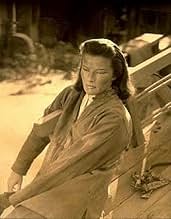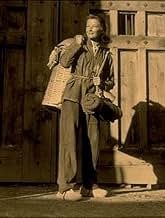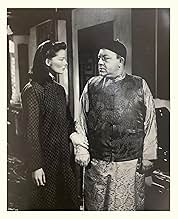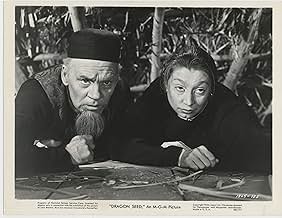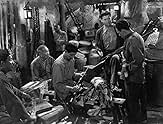VALUTAZIONE IMDb
5,9/10
1394
LA TUA VALUTAZIONE
Aggiungi una trama nella tua linguaThe lives of a small Chinese village are turned upside down when the Japanese invade it, and a heroic young woman leads her fellow villagers in an uprising against these invaders.The lives of a small Chinese village are turned upside down when the Japanese invade it, and a heroic young woman leads her fellow villagers in an uprising against these invaders.The lives of a small Chinese village are turned upside down when the Japanese invade it, and a heroic young woman leads her fellow villagers in an uprising against these invaders.
- Regia
- Sceneggiatura
- Star
- Candidato a 2 Oscar
- 3 vittorie e 2 candidature totali
Philip Ahn
- Leader of City People
- (non citato nei titoli originali)
Albert Baldo
- Japanese Soldier
- (non citato nei titoli originali)
Recensioni in evidenza
It may be disconcerting to see blue-eyed Caucasian actors playing Orientals, but once this initial distraction is over, the story of DRAGON SEED takes over and it's an engrossing one. Film's chief flaw is the fact that Pearl Buck's story is overlong--and so is the film.
Chinese villagers have to flee the enemy, Japanese soldiers, during the 1930s, and WALTER HUSTON and ALINE MacMAHON are the sturdy head of a family that includes daughter KATHARINE HEPBURN, as Jade. None of the three principals are particularly convincing in their Oriental make-up, but it's still fascinating to watch them perform.
HURD HATFIELD, TURHAN BEY, AKIM TAMIROFF, JACQUELINE DeWIT and HENRY TRAVERS are further examples of offbeat casting, but the grim story of survival of the fittest under cruel exploitation by the enemy is well crafted and always interesting to follow.
The film is photographed in meticulous B&W, crisply produced in the handsome MGM manner--with main attention going to Huston and MacMahon who do nicely in the leading roles. Hepburn, thankfully, is less mannered and less on display than usual. One of the most interesting scenes involves her decision to poison her brother-in-law during a banquet at his "mansion".
Summing up: Admirers of other Pearl Buck works (like THE GOOD EARTH) should find this unusual drama well worth watching. MGM should be commended for producing a very tasteful version of the novel. Story ends on a fever pitch with a graphic simulation of "the scorched earth policy" as practiced by the Chinese villagers.
Chinese villagers have to flee the enemy, Japanese soldiers, during the 1930s, and WALTER HUSTON and ALINE MacMAHON are the sturdy head of a family that includes daughter KATHARINE HEPBURN, as Jade. None of the three principals are particularly convincing in their Oriental make-up, but it's still fascinating to watch them perform.
HURD HATFIELD, TURHAN BEY, AKIM TAMIROFF, JACQUELINE DeWIT and HENRY TRAVERS are further examples of offbeat casting, but the grim story of survival of the fittest under cruel exploitation by the enemy is well crafted and always interesting to follow.
The film is photographed in meticulous B&W, crisply produced in the handsome MGM manner--with main attention going to Huston and MacMahon who do nicely in the leading roles. Hepburn, thankfully, is less mannered and less on display than usual. One of the most interesting scenes involves her decision to poison her brother-in-law during a banquet at his "mansion".
Summing up: Admirers of other Pearl Buck works (like THE GOOD EARTH) should find this unusual drama well worth watching. MGM should be commended for producing a very tasteful version of the novel. Story ends on a fever pitch with a graphic simulation of "the scorched earth policy" as practiced by the Chinese villagers.
Those who know little of the invasion of China by the Japanese Imperialist Forces during World War Two can discover general ideas surrounding this period of world history. Granted, the film is somewhat melodramatic in places, and, yes, Westerners made up to look Chinese is somewhat disconcerting as one begins to view this film. Yet, as the film progresses one is soon so overpowered by the action of the film that these minor distractions quickly evaporate. In fact, one soon accepts Katherine Hepburn as Chinese and the true drama dominates the film. The basic theme of the film is the repelling of aggressive forces in one's homeland, a not uncommon theme for 1944. Jade (Hepburn) must not only battle the invaders, she must confront traditional Chinese family values. Both conflicts are challenging to a peaceful rural village about to clash with the changes of the twentieth century. As the film progresses, the agony of family fracture and the immensely powerful drama of the last few scenes turn this film into a sober reminder of the mutability which comes with war. Hepburn is very good in this movie, as is almost all the supporting cast. The "kitchen scene" may be one of the most suspenseful of the World War Two period films. Viewers are reminded that the war between Japan and China began in 1937, four years before United States involvement.
When hard-working China is attacked by the power-hungry Japanese, a pre-feminist Chinese woman struggles with her family for survival; eventually she and her husband become fighters in the Resistance and help to influence their family and fellow villagers to join them. Hollywood product, with intentions that seem sincere, adapted from a Pearl Buck novel and starring...Katharine Hepburn? Actually, Kate is not flossy or "regal" here; she's nobody's fool and probably knows she's miscast, but her Asian make-up is commendable and she tries (not in vain) to find a character. In support, Walter Huston and Aline MacMahon, as Hepburn's Old World in-laws, are excellent. The movie has beautiful cinematography and absorbing passages, but its length is self-defeating and there are some howlers in the script and in much of the casting. Not a hit at the box-office, but by this time people were so used to Hepburn's hit-or-miss choices that it didn't hurt her. *** from ****
Let us get the obvious criticisms out of the way first: DRAGON SEED could be held up as a classic example of mimicry and/or orientalism, with the supposedly Chinese characters played by a variety of actors from different backgrounds. Led by Walter Huston as the familial patriarch, the cast also includes the Russian-born and Stanislavski- trained Akim Tamiroff; Turhan Bey, the Viennese born son of a Turkish father and Czechoslovakian mother; New England patrician Katharine Hepburn; the English-born Henry Travers, and the Irish American J. Carrol Naish as a Japanese kitchen overseer.
On the other hand the film must be approached in context as a propagandist flag-waver designed to highlight the Japanese menace while emphasizing the importance of the global fight for freedom. In these terms Jack Conway and Harold S. Bucquet's epic works extremely well: the Japanese are portrayed as sadistic brutes who will stoop at nothing to achieve their aims - shooting dogs, raping and killing innocent women while relishing the thought of getting Hepburn's Jade Tan into bed. With the aid of Chinese traitor Wu Lien (Tamiroff), they set themselves up in a grand mansion and enjoy elaborate meals prepared by slave cooks, while capturing locals as slave labor.
Pitted against them are the local Chinese, part of a farming community dedicated to centuries-old rituals. Nothing, it seems, can disturb the peace of their lives. When the Japanese invasion occurs, they are pitifully under-prepared to cope: Ling Tan's (Huston's) eldest son Lao Er Tan (Bey) and wife Jade (Hepburn) leave to help build a city in the hills dedicated to making weapons; while another son Lao San Tan (Hurd Hatfield) goes off to join the Chinese army. Ling Tan and his wife (Aline MacMahon) are left behind to forage for themselves, often living on scraps.
While the film emphasizes the importance of rituals as the foundation of a stable society, it also looks forward to the future. Jade wants to teach her newly-born son to read, for it is only through reading that enlightenment can occur. Lao objects at first - he favors more traditional pastimes such as love-making - but as the action unfolds he understands his wife's concern. DRAGON SEED also preaches a doctrine of sexual equality: Jade spends most of the action working alongside her husband in manual labor dressed in overalls rather than the traditional attire of a rural peasant.
In the end even Ling Tan comes to realize the importance of fighting for his country's future, despite his love of peace. The film ends with a climactic sequence reminiscent of MGM's GONE WITH THE WIND, as the Chinese community decamps from its long-established village to make a new home in the hills.
Based on a best-selling novel by Pearl S. Buck, Marguerite Roberts's screenplay contains a few clunky lines, where the propagandist elements assume more significance than plot coherence; but the film offers the role of a lifetime to Turhan Bey, hitherto associated mostly with B-pictures and horror films for Universal. He takes the opportunity with both hands, proving as competent as Hepburn in delivering lines with élan, as well as convincing us of the character's sincerity of purpose.
DRAGON SEED is certainly long - perhaps too long at 144 minutes, but it certainly fulfills its purpose, especially for those forced to fight the Japanese at first-hand during the mid-Forties.
On the other hand the film must be approached in context as a propagandist flag-waver designed to highlight the Japanese menace while emphasizing the importance of the global fight for freedom. In these terms Jack Conway and Harold S. Bucquet's epic works extremely well: the Japanese are portrayed as sadistic brutes who will stoop at nothing to achieve their aims - shooting dogs, raping and killing innocent women while relishing the thought of getting Hepburn's Jade Tan into bed. With the aid of Chinese traitor Wu Lien (Tamiroff), they set themselves up in a grand mansion and enjoy elaborate meals prepared by slave cooks, while capturing locals as slave labor.
Pitted against them are the local Chinese, part of a farming community dedicated to centuries-old rituals. Nothing, it seems, can disturb the peace of their lives. When the Japanese invasion occurs, they are pitifully under-prepared to cope: Ling Tan's (Huston's) eldest son Lao Er Tan (Bey) and wife Jade (Hepburn) leave to help build a city in the hills dedicated to making weapons; while another son Lao San Tan (Hurd Hatfield) goes off to join the Chinese army. Ling Tan and his wife (Aline MacMahon) are left behind to forage for themselves, often living on scraps.
While the film emphasizes the importance of rituals as the foundation of a stable society, it also looks forward to the future. Jade wants to teach her newly-born son to read, for it is only through reading that enlightenment can occur. Lao objects at first - he favors more traditional pastimes such as love-making - but as the action unfolds he understands his wife's concern. DRAGON SEED also preaches a doctrine of sexual equality: Jade spends most of the action working alongside her husband in manual labor dressed in overalls rather than the traditional attire of a rural peasant.
In the end even Ling Tan comes to realize the importance of fighting for his country's future, despite his love of peace. The film ends with a climactic sequence reminiscent of MGM's GONE WITH THE WIND, as the Chinese community decamps from its long-established village to make a new home in the hills.
Based on a best-selling novel by Pearl S. Buck, Marguerite Roberts's screenplay contains a few clunky lines, where the propagandist elements assume more significance than plot coherence; but the film offers the role of a lifetime to Turhan Bey, hitherto associated mostly with B-pictures and horror films for Universal. He takes the opportunity with both hands, proving as competent as Hepburn in delivering lines with élan, as well as convincing us of the character's sincerity of purpose.
DRAGON SEED is certainly long - perhaps too long at 144 minutes, but it certainly fulfills its purpose, especially for those forced to fight the Japanese at first-hand during the mid-Forties.
I was lucky to have watched this movie with my girlfriend's father, who is Chinese. Although he didn't understand a word, he LOVED IT! He was part of the original communist movement and could totally relate to the scenes of farmers taking up arms and meeting in the mountains to plan the fight against the Japanese invaders.
He wondered why, despite the fact that the budding commies in the movie were portrayed as very heroic, he'd never heard of this movie in China. Here is an American movie that glorifies his struggles - that was produced at a time when he was told to completely shun everything Western. Made him think a little, I bet.
Oh, and by the way, don't listen to what anybody else says about the white actors playing Chinese in this movie... it's almost painful to watch!
He wondered why, despite the fact that the budding commies in the movie were portrayed as very heroic, he'd never heard of this movie in China. Here is an American movie that glorifies his struggles - that was produced at a time when he was told to completely shun everything Western. Made him think a little, I bet.
Oh, and by the way, don't listen to what anybody else says about the white actors playing Chinese in this movie... it's almost painful to watch!
Lo sapevi?
- QuizFilmed in 1943 on the MGM lot in Culver City, CA, the film features an unusual assortment of non-Asian actors with odd accents playing Chinese and Japanese: Russian-born and Stanislavski-trained Akim Tamiroff as Wu Lien; Turhan Bey, Viennese born son of a Turkish father and Czechoslovakian mother as the middle son, Lao Er Tan; New England patrician Katharine Hepburn as his wife; American Aline MacMahon--no longer one of the wisecracking La danza delle luci (1933)--as the wife of Ling Tang; English-born Henry Travers (best remembered as Clarence the Angel from La vita è meravigliosa (1946)) as the Third Cousin"; Irish-American J. Carrol Naish as the Japanese Kitchen Overseer; and finally Jewish Robert Lewis, co-founder of the Actors Studio and Meryl Streep's teacher at the Yale Drama School, as Japanese Capt. Sato.
- ConnessioniEdited from La buona terra (1937)
I più visti
Accedi per valutare e creare un elenco di titoli salvati per ottenere consigli personalizzati
- How long is Dragon Seed?Powered by Alexa
Dettagli
Botteghino
- Budget
- 3.000.000 USD (previsto)
- Tempo di esecuzione2 ore 28 minuti
- Proporzioni
- 1.37 : 1
Contribuisci a questa pagina
Suggerisci una modifica o aggiungi i contenuti mancanti

Divario superiore
By what name was La stirpe del drago (1944) officially released in India in English?
Rispondi


